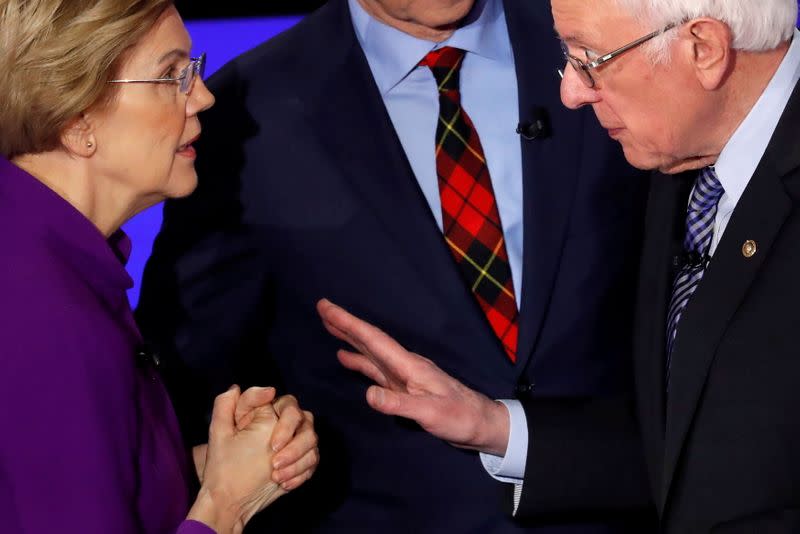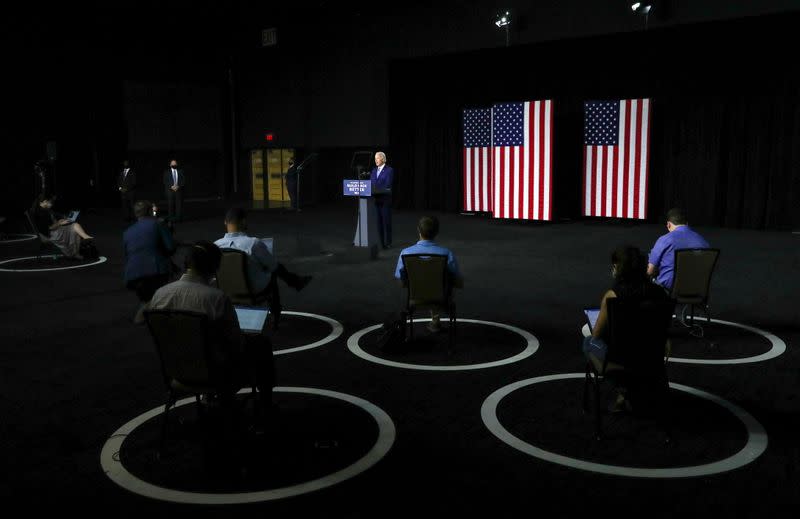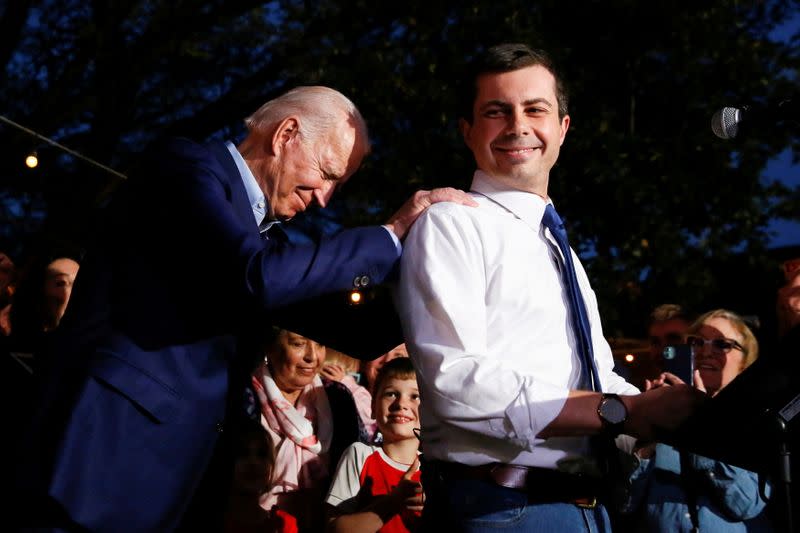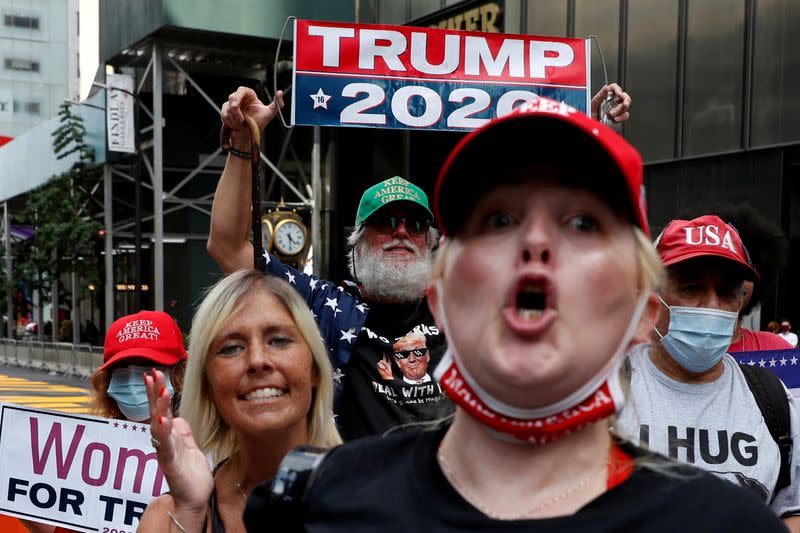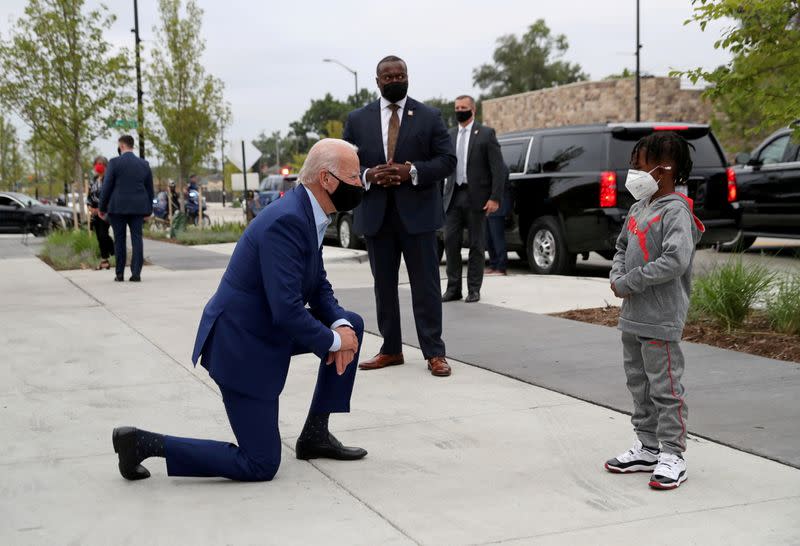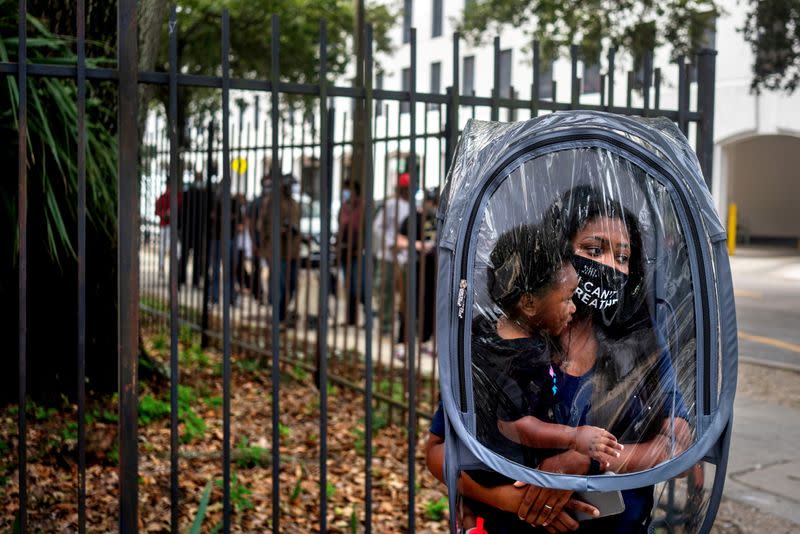Wider Image: U.S. election year shaped by pandemic and Trump's defiance
- Oops!Something went wrong.Please try again later.
By James Oliphant
(Reuters) - The U.S. presidential election was defined at first by a paralyzing coronavirus pandemic that upended traditional campaigning and then by President Donald Trump's frenzied but failing efforts to reverse his loss to Democrat Joe Biden.
The pandemic – and Trump's handling of it – proved to be a big reason why Trump lost. A majority of Americans believed he didn't take the outbreak seriously enough. He flouted safety protocols and insisted the country return to normal as the economy ground to a halt. More than 286,000 lives have been lost to COVID-19 in the United States, by far the worst hit country.
Biden took a different approach. He urged the public to listen to experts and take precautions, including masks and social distancing. He essentially canceled in-person events for months, reaching voters virtually instead. In the end, he was rewarded: Biden received more than 80 million votes – the most of any presidential candidate in U.S. history.
Biden's victory was even more unlikely considering how he began the year. After disappointing finishes in the Iowa caucuses and New Hampshire primary, his presidential bid looked cooked. He argued things would turn around as soon as African Americans began voting in large numbers - and he was right.
Powered by the Black vote, Biden blew the field away in South Carolina, causing several rivals to drop out immediately and setting the stage for a stunning run that sewed up the nomination in a matter of weeks. His final challenger, liberal Senator Bernie Sanders, bowed out in April, allowing Biden to turn his focus squarely to Trump with nearly seven months to go.
Meanwhile, the president was struggling to respond to the burgeoning COVID-19 outbreak. After weeks of downplaying the threat, Trump delivered a rare address from the Oval Office that failed to reassure a jittery public. The virus would go on to reshape American life, closing schools, businesses and restaurants, trapping millions at home and becoming the dominant issue of the 2020 election.
With the death toll from the pandemic nearing 50,000 by late April, Trump at one of his briefings spontaneously suggested that injecting disinfectants such as bleach into the human body could eliminate the virus. Health experts quickly warned the public that doing so would be toxic, and Trump later claimed he was being sarcastic.
Trump also became increasingly at odds with a racial justice movement that swept U.S. cities in the wake of the death of George Floyd, a Black man, under the knee of a white Minneapolis police officer. In June, U.S. Park Police and National Guard troops, clad in riot gear, used pepper spray to clear the park outside the White House of protesters so that Trump could walk to a historic church and pose for a photo holding a Bible. But opinion polls showed Americans largely supported peaceful protests for racial justice.
With that as a backdrop, Biden's decision to make Senator Kamala Harris, a Black woman, his running mate was particularly resonant. In Congress, Harris had worked on police reform efforts since Floyd's death. Her selection energized the Democratic base, and her personal fundraising network helped Biden rake in an unprecedented flood of donations that eliminated Trump's cash advantage.
Needing something to turn his fortunes around, Trump came into his first debate with Biden in September looking for a fight. But his belligerence worked against him. He repeatedly interrupted Biden and the moderator to the point where the entire event veered out of control. Polls and focus groups conducted afterward showed swing voters were repulsed by his behavior.
Still, the election outcome was far from certain. Trump remained popular with many voters, who turned out in droves for his in-person rallies, sporting 'Make America Great Again' caps and t-shirts. Safety measures against the spread of the virus were largely ignored, and - just as some Americans were casting early ballots - Trump and several aides tested positive for COVID-19.
Even with coronavirus cases spiking anew, Americans voted in record numbers, many mailing in ballots, while others waited in long lines.
While the race was too close to call on Election Day, Biden steadily pulled ahead of Trump in several critical battleground states and ended up with a resounding win. Biden amassed 306 electoral votes - exceeding the necessary 270 - compared to 232 for Trump in the state-by-state Electoral College that determines the presidency, while also winning the national popular vote by more than 7 million votes. Harris made history as the first woman to be elected vice president.
Trump, however, would not concede and for weeks since the election has falsely claimed that widespread fraud cost him a second White House term. His legal team - including former New York mayor Rudy Giuliani - filed lawsuits in several states contesting the election results. None of the efforts have been successful.
When the Electoral College meets on Dec. 14 to cast its votes, Biden's victory will be official. While Trump seems intent on refusing to concede, the expectation remains that he will leave office on Jan. 20, when Biden will be sworn in as the nation's 46th president.
(Writing by James Oliphant, Editing by Soyoung Kim and Rosalba O'Brien)

